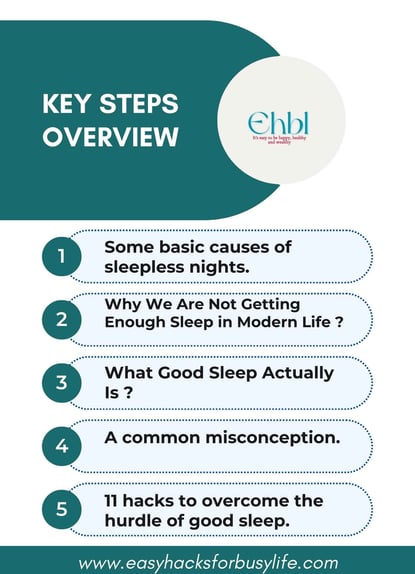11 Easy Hacks For Busy People To Resolve Can't Sleep Issue.
Lay in Bed for Hours Can't Sleep? Here Everything You Need to Know From What a Good Sleep Means to Why You Can't Sleep and 11 Easy Hacks For You To sleep Well.
1/3/20256 min read


photo credit: freepik
Do you ever wake up exhausted, as if the night's sleep didn't count? Or are you someone who burns the midnight oil and only crawls into bed when the sun starts to rise? Whether battling groggy mornings or late-night habits, sleep can often feel like a puzzle you can't solve. But have you ever wondered what good sleep actually means? And if your life forces you to sleep during the day, is it even possible to rest as well as others do at night?
Some Basic Causes of Sleepless Nights:
If someone passes sleepless nights, there is always a chance to have some medical issues like insomnia, sleep Apnea or issues with mental health.
However, in the easy hacks for busy life platform, our main focus is to address the problems millennials face in everyday life and develop easy hacks to solve those problems. To keep this in mind In this article, we will focus more on why, as a modern human being, we are facing more sleep problems than our ancestors and what easy hacks we can use to find a balanced ground to sleep plus all the modern-day activities.
Why We Are Not Getting Enough Sleep in Modern Life:
I think that because of the rapidly evolving lifestyles and the constant glow of technology, the modern generation is experiencing a sleep crisis. Our ancestors slept soon after sunset and woke up by the sun's natural cycle at dawn. However, the advent of artificial light, late-night screen usage, and round-the-clock networking is causing more disruptions to our internal body clocks than ever before. Considering the increasing popularity of caffeinated drinks, inconsistent work hours, and the constant demand to "hustle," you can understand why sleep deprivation is becoming the standard.
The consequences are staggering. Poor sleep isn't just about feeling tired—it's linked to long-term issues like anxiety, memory problems, weakened immunity, and even chronic diseases like diabetes and heart conditions. If this trend continues unchecked, future generations may face a world where sleep disorders are as common as colds, and productivity might come at the cost of our health. Before we discuss how we could get a good night's sleep, I think we should first know what good sleep is and what science says about it.
What Good Sleep Actually Is:
Sleep quality is more important than the quantity of time you spend in bed. According to science, good sleep is getting around seven to nine hours of sleep per night, although individual needs can vary. It should be mostly uninterrupted, allowing your body to cycle through the different stages of sleep, such as light sleep, deep sleep, and REM (rapid eye movement) sleep. Each stage has a distinct function: REM sleep promotes memory and emotional well-being, while deep sleep heals the body. Science also emphasizes that good sleep leads to feeling refreshed, focused and energized rather than groggy. Ultimately, Good sleep contributes to both physical and mental well-being, making it essential for overall health.
A Common Misconception:
A prevalent misconception is that getting less sleep is acceptable as long as you "catch up" on the weekends. Sleep debt, however, builds up over time and is not entirely repayable. According to a study, Chronic sleep deprivation affects your heart, brain, and general health, regardless of how hard you attempt to make up for it later.
Is There Any Good News for Modern Humans?
After reading about the requirement of good sleep, you may probably think, oh man! In this era, it's not possible for me to have a good night's sleep.
To be honest, it is possible to get healthy, peaceful sleep regardless of your lifestyle, whether you are a night owl, work in shifts, or have a busy schedule.
Like all the other good habits, it's hard at the beginning, but once you teach your body and mind to adapt to healthier sleeping practices with a few tweaks, it will become a habit, and then …
Have to do it every day!!
Now that we understand the science behind good sleep and modern life's challenges, let's explore practical solutions. These 11 hacks help you fall asleep faster, stay asleep longer, and wake up feeling refreshed. Some are less talked about but can profoundly impact your sleep quality.
1. Draw a red line for caffeinated drinks
Caffeine can stay in your system for hours, often disrupting your ability to fall asleep even if you don't feel "wired." Limit coffee, tea, or energy drinks at least 6-8 hours before bedtime. If you need an afternoon pick-me-up, opt for herbal teas like chamomile, which can promote relaxation.
2. The impact of Magnesium on sound sleep
Magnesium is like nature's chill pill. It relaxes your muscles and nervous system, preparing your body for sleep. Include magnesium-rich foods in your diet, like spinach, nuts, seeds, and dark chocolate. A magnesium supplement or Epsom salt bath can work wonders if needed, but always consult a doctor first.
3. Let's Guided with sunlight
Did you know that sunlight plays a significant role in regulating your sleep-wake cycle? Our bodies have an internal clock known as the circadian rhythm, which governs when we feel awake and sleepy. Morning light acts as a natural reset button for this Clock, signalling to your brain that it's time to wake up and be alert.
4. Environment is the Key
Your bedroom should be a sacred space dedicated to relaxation. Keep it free of distractions like TVs, work desks, or clutter that signals anything other than sleep. Think of it as your sanctuary—a place where you can escape from the noise of the world. Invest in blackout curtains to eliminate light, use calming colours for your decor, and choose a mattress and pillows that support your body's needs. The idea is simple: your brain should immediately associate it with peace and rest when entering your bedroom.
5. Adjust Your Bedroom Temperature
A cooler bedroom temperature helps your body signal that it's time for sleep. Research shows the ideal range is around 60-67°F (15-19°C). If you find it hard to regulate room temperature, consider breathable sheets, cooling pillows, or even a fan.
6. Relax the muscles and mind
Progressive muscle relaxation is a proven technique for releasing tension and preparing your body for sleep. Lie down, close your eyes, and start tensing one muscle group at a time—beginning with your toes and working your way up to your head. Hold the tension for a few seconds, then slowly release. By the time you finish, your body will feel like it's melting into the bed.
7. Warming Up your feet
Ever wake up in the middle of the night feeling cold? Your feet might be the problem. Wearing socks or using a hot water bottle to keep your feet warm can improve blood circulation and help your body stay cosy, leading to deeper sleep.
8. The Scents of chamomile show you the path
Lavender isn't just a fragrance; it's a natural sleep aid. Studies show that the scent of lavender can reduce heart rate and blood pressure, putting your body in a relaxed state. Use a lavender essential oil diffuser, pillow spray, or soothing lavender-scented lotion before bed.
9. A Pre-Sleep Ritual is worth it
Just like children benefit from bedtime routines, adults can too. Whether reading a book, dimming the lights, journaling, or meditating, having a consistent pre-sleep ritual trains your brain to recognize when it's time to wind down. Avoid anything overly stimulating, like scrolling on your phone or watching action-packed shows.
10. don't look at the Clock
Watching the Clock while struggling to sleep only makes things worse. It fuels anxiety and the constant mental math of "How many hours do I have left?" Instead, turn your Clock to face the wall or move it out of sight. If you need an alarm, use a calming sound instead of a jarring one to start your day peacefully.
11. Dive deep with Positive Thinking
Instead of stressing over not falling asleep, shift your mindset. Tell yourself, "Even lying here and resting is good for me." This approach reduces performance anxiety around sleep, which can often be the root of sleepless nights.
While these easy-to-follow 11 hacks will help you fall into deep sleep, you should also consider some extra tips to get the best result. Such as,
Be cautious About Naps:
While short power naps can be beneficial, long or irregular naps can confuse your internal Clock, making it harder to fall asleep at night. If you need a nap, keep it short, around 15-20 minutes in the early afternoon. This will allow you to compensate for lost sleep without interfering with your nighttime sleep.
Need to Avoid Late-Night Meals and Drinks:
Eating large meals or drinking too many liquids close to bedtime can negatively impact sleep. Try to have dinner at least a few hours before bed. Reduce fluid intake 1–2 hours before bed. This reduces the chances of waking up in the night to use the bathroom due to nocturia.
Let's Hack the Hurdle
Your health and happiness should always be your top priority, regardless of age. Start with small adjustments, pay attention to your body, and stay dedicated to identifying the best fit for you. At the end of the day, better sleep equals better you—a happier, healthier, more productive version of yourself.
These 11 hacks are easy to use. They'll help you take control of your nights and feel refreshed and ready for action when you wake up.


Want to know more about me? How do I hack the hurdle and try to live a meaningful life? I am welcoming you to my Journal of Thought. Please click here to visit the page.
And thank you for all the support and love.
